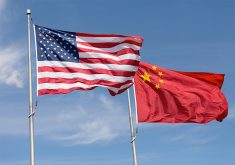The World Trade Organization has ruled that the U.S. mandatory country-of-origin labelling law is a trade violation.
An appeal decision was released June 29 that upheld the initial ruling made late last year. The law applies to all fresh meat and produce sold at the retail in the United States.
The tribunal found the original panel did not err in stating COOL discriminates against imported livestock over domestic livestock. It also said the law creates a disincentive to handle imports.
This decision is final, so the appellate body recommends the U.S. bring its law into conformity to meet its world trade obligations.
Read Also

Federal budget draws mixed reaction from Canadian agriculture groups
The 2025 federal budget took a step forward in recognizing agriculture’s importance but failed to address pressing challenges like labour disruptions, interswitching and precision technology, say Canadian farm groups.
“We fully expect the United States will fully respect this decision,” said agriculture minister Gerry Ritz at a news conference.
Implemented in 2008, COOL is estimated to have affected exports of live cattle and hogs by 50 percent. It discounted sales of Canadian cattle by at least $25 a head.
The Canadian Pork Council estimates the loss of exports cost $1.4 billion since the law went into effect.
“It is a good day for Canadian cattle producers today. We were always very confident we would win this thing,” said Martin Unrau, president of the Canadian Cattlemen’s Association.
The CCA has spent $2 million in legal fees and advocacy fighting the law.
The CCA wants an amendment to the law to make sure Canadian livestock is treated the same as American cattle and hogs.
Ray Price, chair of the Canadian Meat Council, which represents processors, said this decision fits into agreements between the two countries to cut red tape and create a more open border.















